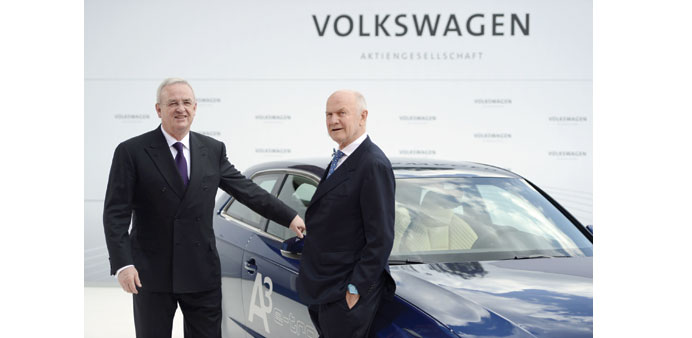Volkswagen CEO Martin Winterkorn (left) and chairman of the supervisory board Ferdinand Piech posing in front of an Audi A3 electric car in Wolfsburg. Almost 80% of VW investors expect the carmaker’s stock market value to increase after Piech’s departure as it may help unlock greater earnings potential at the 12-brand group, a survey by advisory firm Evercore ISI showed.
Reuters
Berlin
Investors hope that Volkswagen will be able to revive profitability at its core division, cure underperformance overseas and bury lingering plans for acquisitions after the resignation of Chairman Ferdinand Piech.
Piech, the mastermind of VW’s global expansion and a towering figure at the German group for more than two decades, stepped down on Saturday after losing a showdown he had provoked with Chief Executive Martin Winterkorn.
Almost 80% of VW investors expect the carmaker’s stock market value to increase after Piech’s departure as it may help unlock greater earnings potential at the 12-brand group, a survey by advisory firm Evercore ISI showed.
Preference shares in Volkswagen rose more than 5%, nearly making up for a slide in value during the two-week boardroom battle. The shares were trading up 4.2% at €242.80 as of 1224 GMT. The exit of Piech, who spearheaded VW’s campaign to make everything from motorcycles to 40-tonne trucks, also curbs the risk of purchases while VW is cutting billions of euros of costs at its core brand and revamping operations, Evercore ISI said.
“Piech’s departure is good news for VW,” said Evercore ISI analyst Arndt Ellinghorst, who raised his recommendation on the stock to “buy” from “hold”. “VW has a better chance to turn itself into a more profitable and valuable business.”
Empire-building at VW, which only a year ago took full control of Swedish truckmaker Scania, should play a smaller role in the post-Piech era, analysts said, noting that Piech had appeared keen to buy Fiat Chrysler’s Alfa Romeo brand.
Under Piech’s nine years as CEO, VW bought ultra-luxury brands Bugatti, Bentley and Lamborghini, integrated Spanish volume unit Seat and raised its stake in Czech division Skoda.
“The sheer complexity of VW is starting to hit the wall,” said Ingo Speich, a fund manager at Union Investment which holds 0.6% of VW preference shares. “There are numerous trouble spots at VW that urgently need to be tackled now.”
The relentless push for scale under the once-close Winterkorn-Piech alliance, which led VW to almost double sales to 202bn euros last year and nearly triple group profit, has papered over structural shortcomings at the German behemoth, analysts have said. Winterkorn is aiming to revive flagging profitability at the core namesake division, pushing plans to increase cost savings to €5bn ($5.42bn) a year by 2017 as the group sheds its volume-driven focus.
“More than 600,000 workers build slightly fewer vehicles than market champion Toyota with 350,000 workers,” wrote Ferdinand Dudenhoeffer, head of the Center of Automotive Research at the University of Duisburg-Essen.

